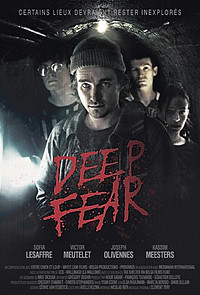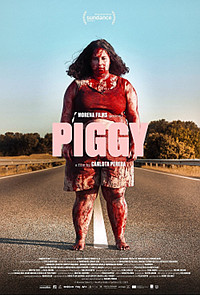| SHADOWS ON THE WALL | REVIEWS | NEWS | FESTIVAL | AWARDS | Q&A | ABOUT | TALKBACK | |||||||||||||||||||||||||||||
 Shadows off the beaten path Shadows off the beaten pathIndies, foreign, docs and shorts...
On this page:
DEEP FEAR |
HOW IS KATIA? |
PIGGY
| |||||||||||||||||||||||||||||
| See also: SHADOWS FILM FESTIVAL | Last update 28.Aug.22 | |||||||||||||||||||||||||||||
|
Deep Fear Review by Rich Cline | 
 Is it streaming?
| 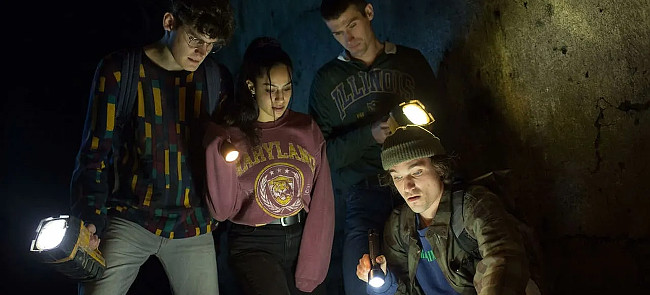 Earthy and confident, this French thriller maintains a lightly comical tone while layering in the usual hints that something horrific is brewing. This includes a standard randomly violent opening scene and a freak-out dream before the plot even begins, sending four young people on a day out that looks intriguing, fun and of course more than a little harrowing. It's a sharply well-made movie with a seriously vicious streak. In 1991 Paris, Sofia (Lesaffre) has a plan to celebrate graduation with her friends Max and Henry (Meesters and Meutelet), setting it up for Ramy (Olivennes) to take them on a tour in the catacombs deep beneath the city. Underground, they meet Ramy's cataphile buddies, including Lamia (Francois-Janssens), whose brother disappeared here two years earlier. But when they encounter a group of violent skinhead thugs, they get lost running away, stumbling into an even deeper underground complex that's perilously booby-trapped and has suspiciously German signage everywhere. And they realise they're not alone down here. With very little set-up, the characters only occasionally get a chance to reveal themselves along the way. Progressing steadily, the narrative has a nice sense of momentum through a series of discoveries and incidents, plus a few red herrings. Director Beghin finds clever ways to vary the imagery, with caverns that are magnificently expansive or mind-bogglingly tight. Each section of the catacombs reveals some new danger, leading to some strikingly understated effects work (and also some digital dodginess). The script is too locked into its horror roots to make much of the characters, and they do pretty much what's expected of them. Meutelet has the strongest role, as the cocky Henry is forced to reckon with his vulnerability on a journey that's both physical and mental. For Meesters' Max, the main challenge is to overcome his crippling fear, which at least adds some sympathy with the character. Sonia is far less defined, but Lesaffre plays up her intelligence and tenacity. There aren't many deeper themes at work here, as writing and direction maintain a focus on the more elemental story ingredients, most notably the characters' fear. With the presence of the skinheads, and the fact that they seem to have discovered a vast Nazi bunker, there are some bigger topics lurking around the edges. But the filmmakers are more interested in adding grotesque violence at every step along the way. So if it's never very scary, at least there's some nasty claustrophobia and gleeful yuckiness for the fans.
|
| How Is Katia? Review by Rich Cline | 
| 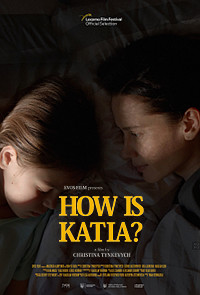 dir Christina Tynkevych prd Vlad Dudko, Olha Matat scr Christina Tynkevych, Serhii Kastornykh, Julia Gonchar, Natalia Blok with Anastasiya Karpenko, Kateryna Kozlova, Tatyana Krulikovskaya, Iryna Verenych-Ostrovska, Aleksey Cherevatenko, Sergey Kiyashko, Yelena Khokhlatkina, Ihor Koltovskyi, Viktor Zhdanov, Tatiana Ostretsova, Yurii Felipenko, Elena Lazovich release WP Locarno Aug.22 22/Ukraine 1h41 LOCARNO FILM FEST Is it streaming?
| 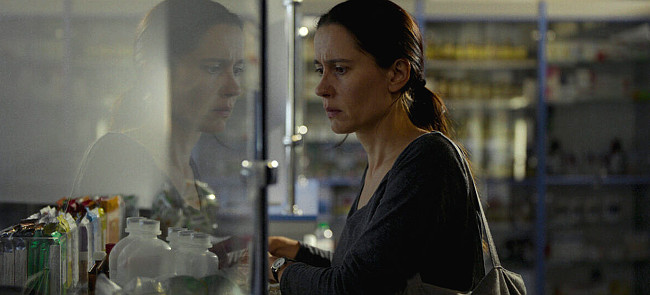 Photographed in a way that's intimate while vividly capturing the expansive settings, this Ukrainian drama centres on a mother-daughter relationship. Earthy and authentic, the film follows rhythms of life most people can identify with, while director Christina Tynkevych beautifully highlights the emotions in the story without ever pushing them. That said, it does paint a very bleak picture of how a callous society can cruelly crush an innocent person. As a Kyiv paramedic and single mother, Anna (Karpenko) has little spare time. But she wants to create a better life for her cheeky preteen daughter Katia (Kozlova) and ageing mother (Khokhlatkina). Anna gets some help from her unreliable sister Inga (Krulikovskaya), and has made a down payment on a new flat. Then Katia is hospitalised after a car accident, and the driver's politician mother (Verenych-Ostrovska) tries to erase her daughter's (Ostretsova) crime with cash. In addition, the hospital is cutting corners and won't pay for expensive treatment. So Anna is pushed into a corner. Cinematographer Vladislav Voronin's extended handheld takes give the film relentless energy. Anna's only respite from the stress is brief time with her married boyfriend (Cherevatenko), although of course his assistance is very limited. Tynkevych makes remarkable directorial decisions, drawing out wrenching underlying emotions with inventive skill. And because the film so tightly focusses on Anna, the journey the audience takes with her is often deeply harrowing, as justice seems to get ever more elusive. At the centre of virtually every shot, Karpenko finds terrific nuance as this frazzled woman tenaciously holds things together. Her darker feelings are only occasionally visible, because she reins them in so she can get on with whatever daunting task she has to take on next. As events close in around Anna, Karpenko adeptly reveals her steely resolve, so Anna takes a stand for integrity even when things begin to feel hopeless. This leads to a series of pungent scenes in which various women confront each other about issues relating to motherhood. The desperation Anna faces will be instantly recognisable for anyone who isn't wealthy. It's astonishing how quickly mounting hospital bills shift her situation from a tight budget to potential financial ruin. Even more shocking is how the cold-hearted system leaves her high and dry, as do people she needs to rely on for assistance. So while Tynkevych's approach feels sometimes forensic, it has larger ramifications that will echo around the world, highlighting one of the harsher aspects of modern society.
|
| Piggy Cerdita Review by Rich Cline |  MUST
MUST  SEE SEE
SUNDANCE FILM FEST  Is it streaming?
| 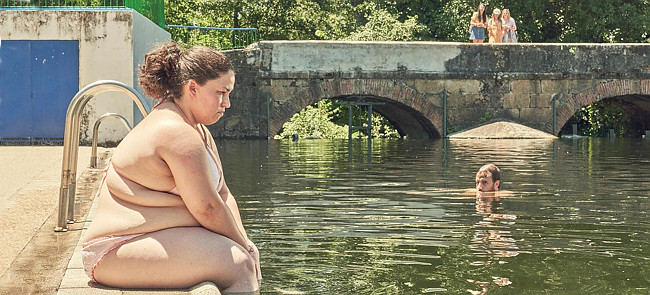 Bright, sunny and blackly humorous, this small-town Spanish drama takes an unblinking look at bullying and the complex emotions it evokes. Even more than a fiendishly clever approach to a serious topic, the film is an audacious genre mashup, mixing a high school comedy with a tense horror movie. Writer-director Carlota Pereda has a terrific eye for detail, and notable skill as a storyteller who cares about her characters. Working at her family's butcher shop, teen Sara (Galan) is horrifically tormented by cool kids who sneer at her weight. After the girls steal her bag at the town pool, she takes the long walk home in her bikini. Assaulted by boys on the road, she has an even scarier encounter with a stranger (Holmes) who might be an avenging angel. So when three mean girls (Ferreiro, Aguilar and Salas) go missing, Sara is conflicted about revealing what she knows, even when the body count starts rising. But she knows she'll have to do something. Each scene is a bundle of uncontrollable feelings, as Sara hides her thoughts and feelings, and her secret snacking habits, from her hot-tempered mother (Machi) and hapless father (Valcarcel). The escalating chaos in town, as parents search for children and two very different cops (del Barco and Delgado-Hierro) try to resolve an increasingly nasty mystery, has an unusual honesty to it even when the plot begins to turn murky. And where it goes is such a collision of conflicting feelings that it properly messes with our sympathies. Galan's performance has a visceral honesty to it that's deeply engaging right from the start. It's astonishing to be able to feel each one of Sara's messy emotions as the narrative progresses, reacting to the various people who hurt or help her, continually shifting balance of power under her feet. The surrounding characters are equally vivid, most notably Machi as Sara's overpowering mother. Even Holmes adds layers to his sinister stranger, shifting the film in directions that are much darker than expected. The way the story presses in on Sara is astonishingly visceral, so her climactic explosion of rage is fully understandable. But then, each of the film's most intense moments is played with an uncanny resonance. Frankly, when a serial killer is the first person to ask Sara if she's OK, we know we're someplace far beyond the banal moral platitudes most movies throw at us. This turns the usual horror set-pieces on their heads, heightening the dramatic tension rather than the cheap scares.
| 
See also: SHADOWS FILM FESTIVAL © 2022 by Rich Cline, Shadows
on the Wall
HOME | REVIEWS | NEWS | FESTIVAL | AWARDS
| Q&A | ABOUT | TALKBACK | | |||||||||||||||||||
